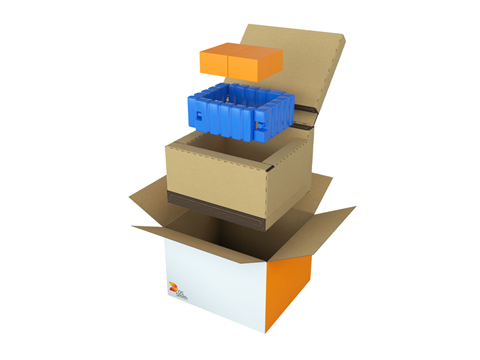
DS Smith presented a new fibre-based, temperature-controlled packaging solution at PharmaPack Europe 2025 – highlighting its recyclability, 36-hour cooling period, and customizability via a parametric algorithm.
TailorTemp is hoped to help pharmaceutical and biotech businesses pursue their sustainability targets when storing and transporting delicate medicinal products in temperature-controlled conditions.
Both the outer box and insulant materials of the solution are designed by DS Smith and made of corrugated cardboard. Reusable coolant elements, i.e. gel packs, are not currently supplied by the company.
Intended to replace expanded polystyrene (EPS) alternatives, the components are described as 100% plastic-free and recyclable. Whereas EPS boxes often require transportation in a constructed form, TailorTemp is designed to be shipped to customers in flatpack format, and can then be assembled at the end of the production line or on-site by the customer – thus achieving inbound and outbound space optimization.
In use, the pack can apparently stay cool for up to 36 hours in a constant temperature profile of 23°C. ISTA 7D Winter and Summer profiles are still pending validation by DS Smith designers.
A computer-based parametric algorithm – developed by DS Smith and an independent laboratory specializing in thermal transfers – can be used to determine the pack’s dimensions, insulating thickness, and coolant quality. Designers can then reference the outcomes of its modelling tool to streamline prototyping and validate solutions in real conditions.
Through this process, customers can tailor the pack to their individual needs. They can right-size the pack to the product to minimize unnecessary material use and reduce waste; meanwhile, predictive modelling can account for temperature changes in storage or transit and design the pack accordingly.
According to DS Smith’s Circular Design Metrics tool, a 42mm corrugated insulant reduced by 40% compared to a 50mm EPS insulant in a specific customer case study. However, the exact measurement of CO2 reduction is thought to differ between customers’ packaging specifications.
DS Smith hopes that phasing out EPS and plastics while improving the recyclability of pharma and biotech packaging will align with the incoming Packaging and Packaging Waste Regulation, as well as its own target-led Now and Next Sustainability Strategy.
Marlena Hardy, innovation product manager at DS Smith, commented: “TailorTemp demonstrates just how versatile and reliable fibre-based material can be, not only to maintain temperatures in cold chain logistics, but also to deliver a recyclable outcome for customers seeking to meet sustainability targets.
“Design is everything, and our team is using specialist predictive modelling in the creation solutions for our pharma customers that are fit for purpose and then validating them in the laboratory without delay.
“We are delighted to have hit the crucial thirty-six-hour milestone for cold chain storage and transportation, but the team is already hard at work on extending this to an even longer time period, and we think we will soon be able to extend TailorTemp’s ability to maintain cool temperatures to 96 hours and above.
“Customers are increasingly demanding sustainable and recyclable packaging solutions, so the benefit of replacing EPS with a fibre-based solution can’t be overlooked and bespoke EPS solutions can be cost prohibitive. We are excited for what we can achieve with pharma and biotech businesses.”
A new surface treatment, insulating materials, and process innovations are currently being developed, according to DS Smith. These are intended to extend the pack’s maintenance of cool temperatures to 96 hours and above.
PharmaPack Europe took place in Paris from 22nd – 23rd January 2025.
A similar development came all the way back in 2023, when Ranpak’s RecyCold climaliner solution was released. Designed for cold chain shipping in a variety of sectors, the paper-based thermal liner claimed to be recyclable and keep products cold for up to 48 hours.
More recently, 2nd Level Global Solutions has unveiled its Solaris range of recyclable, paper-based thermal pallet covers to protect products against temperature fluctuations in transit; while DGeo and Lifoam Industries seek to tackle the pollutive properties of temperature-controlled EPS packaging with a biobased additive, thought to improve biodegradability without leaching microplastics.
To learn more about the ways cold chain corrugation could address the challenges associated with corrugated board, our editor at large, Elisabeth Skoda, spoke to H.B. Fuller’s Elizabeth Staab and Interpac’s Charles Smith in a LinkedIn Live session.
If you liked this story, you might also enjoy:
Reuse vs. single use – which is better for the environment?
Sustainable Innovation Report 2025: Current trends and future priorities
What can the world learn from South Korea’s world-leading performance in plastics circularity?














No comments yet